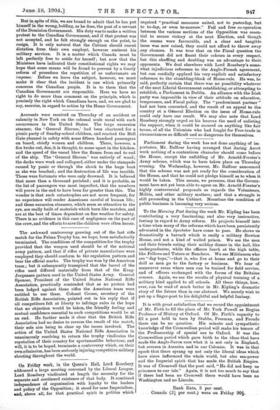On Friday week, in the Queen's Hall, Lord Rosebery addressed
a large meeting convened by the Liberal League. Lord Rosebery vindicated at length the necessity for the separate and continued existence of that body. It combined independence of organisation with loyalty to the leaders and policy of the Opposition; it stood for sane Imperialism, and, above all, for that .practical spirit in politic,s which required "practical measures suited, not to yesterday, but to to-day, or even to-morrow." Full and free co-operation between the various sections of the Opposition was essen- tial to secure victory at the next Election, and though the omens were favourable, and a clear and tangible issue was now raised, they could not afford to throw away any chances. It was true that on the. Fiscal question the Government did not flaunt their colours in every respect, but this shuffling and doubling was an advantage to their, opponents. We deal elsewhere with Lord Rosebery's some- what injudicious reference to the Anglo-French agreement, but can cordially applaud his very explicit and satisfactory. reference to the stumbling-block of Home-rule. He was, he said, perfectly certain that there was no possibility whatever of the next Liberal Government establishing, or attempting to establish, a Parliament in Dublin. An alliance with the Irish party was impossible in view of their attitude on education, temperance, and Fiscal policy. The "predominant partner" had not been converted, and the result of an appeal to the country at a, General Election on the issue of Home-rule could only have one result. We may also note that Lord Rosebery _strongly urged on his hearers the need of enlisting the support, when ,it could be secured on anything like fair terms, of all the Unionists who had fought for Free-trade ixA circumstances so difficult and so dangerous for themselves.






































 Previous page
Previous page